Legal Analysis: Australian Contract Law, Minors, and Case Study Report
VerifiedAdded on 2023/01/23
|5
|1395
|73
Report
AI Summary
This report provides an analysis of Australian contract law, focusing on the legal capacity of minors to enter into contracts. It explores the legal age requirement of 18 years and the concept of contractual capacity, highlighting that minors generally have restricted capacity. The report explains the exceptions to this rule, such as contracts for essential items like food and healthcare, and the need for parental or guardian consent. It discusses the consequences of minors entering into contracts for non-essential items and the potential for such contracts to be voidable. The report references relevant legislation, including the Goods Act 1923 (NSW) and the Supreme Court Act 1935, and provides a case study involving a minor and a car purchase, illustrating how contract law principles apply in practice. It also covers the legal recourse available to minors and the role of legal representatives in such matters. Finally, the report includes a comprehensive bibliography of sources used.
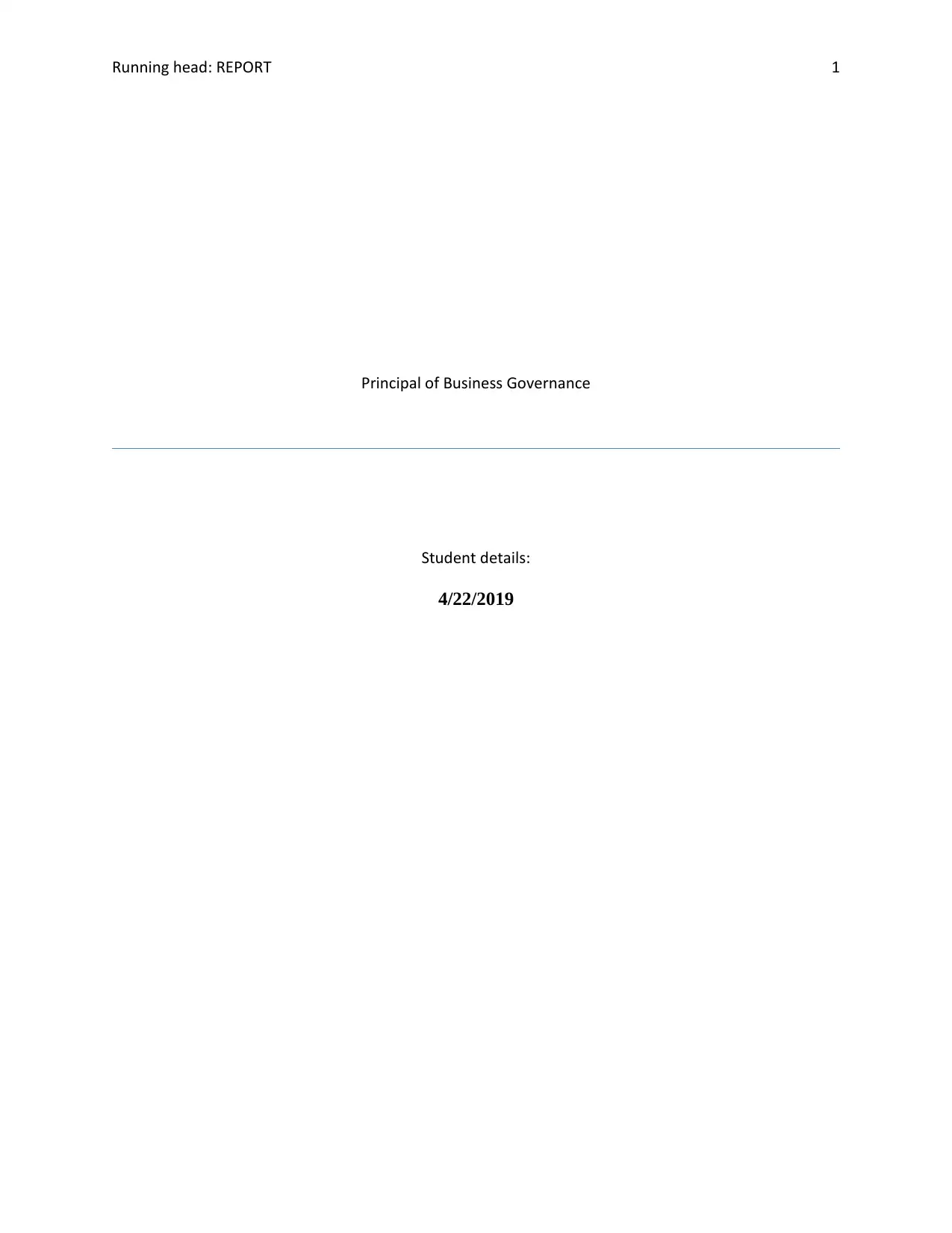
Running head: REPORT 1
Principal of Business Governance
Student details:
4/22/2019
Principal of Business Governance
Student details:
4/22/2019
Paraphrase This Document
Need a fresh take? Get an instant paraphrase of this document with our AI Paraphraser
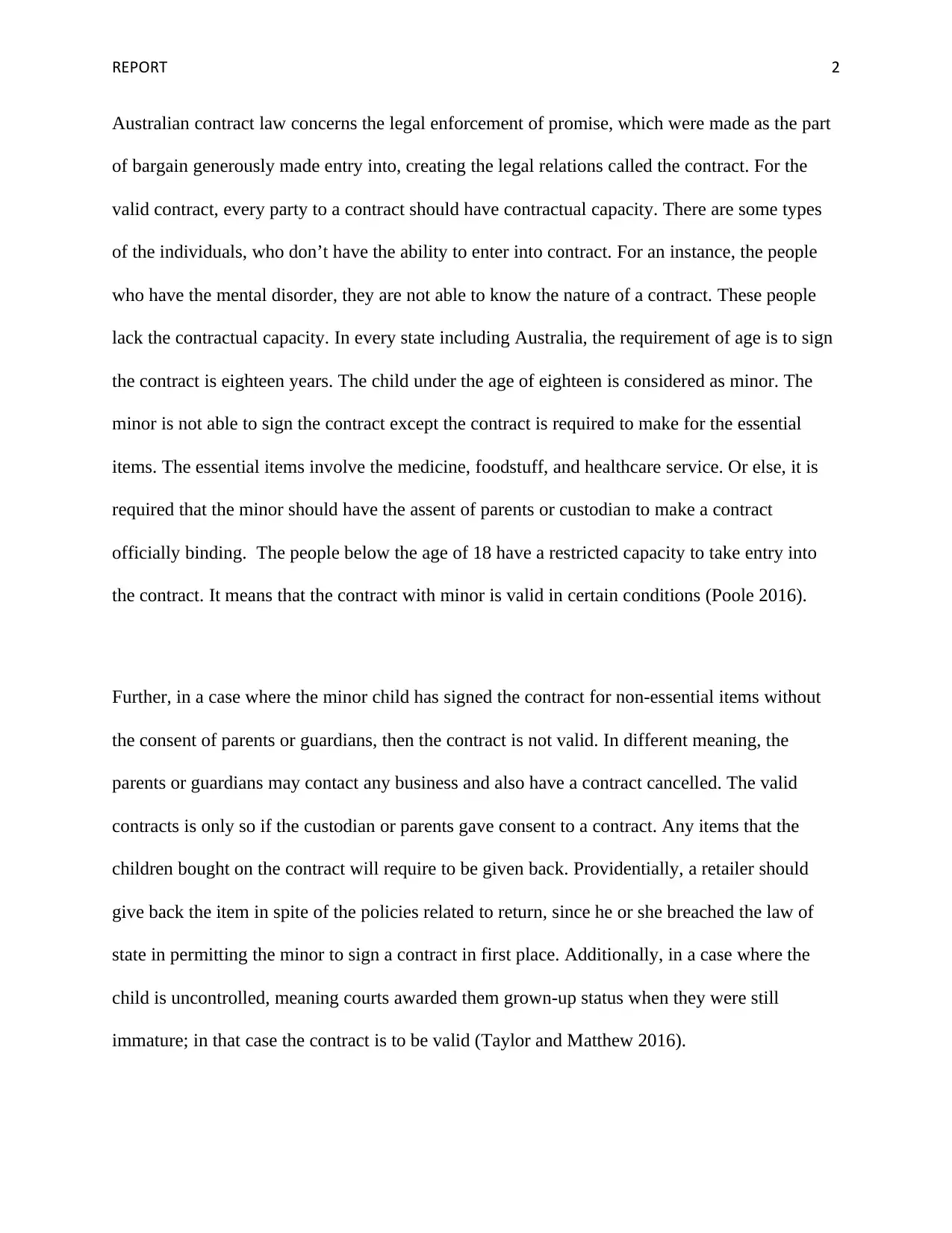
REPORT 2
Australian contract law concerns the legal enforcement of promise, which were made as the part
of bargain generously made entry into, creating the legal relations called the contract. For the
valid contract, every party to a contract should have contractual capacity. There are some types
of the individuals, who don’t have the ability to enter into contract. For an instance, the people
who have the mental disorder, they are not able to know the nature of a contract. These people
lack the contractual capacity. In every state including Australia, the requirement of age is to sign
the contract is eighteen years. The child under the age of eighteen is considered as minor. The
minor is not able to sign the contract except the contract is required to make for the essential
items. The essential items involve the medicine, foodstuff, and healthcare service. Or else, it is
required that the minor should have the assent of parents or custodian to make a contract
officially binding. The people below the age of 18 have a restricted capacity to take entry into
the contract. It means that the contract with minor is valid in certain conditions (Poole 2016).
Further, in a case where the minor child has signed the contract for non-essential items without
the consent of parents or guardians, then the contract is not valid. In different meaning, the
parents or guardians may contact any business and also have a contract cancelled. The valid
contracts is only so if the custodian or parents gave consent to a contract. Any items that the
children bought on the contract will require to be given back. Providentially, a retailer should
give back the item in spite of the policies related to return, since he or she breached the law of
state in permitting the minor to sign a contract in first place. Additionally, in a case where the
child is uncontrolled, meaning courts awarded them grown-up status when they were still
immature; in that case the contract is to be valid (Taylor and Matthew 2016).
Australian contract law concerns the legal enforcement of promise, which were made as the part
of bargain generously made entry into, creating the legal relations called the contract. For the
valid contract, every party to a contract should have contractual capacity. There are some types
of the individuals, who don’t have the ability to enter into contract. For an instance, the people
who have the mental disorder, they are not able to know the nature of a contract. These people
lack the contractual capacity. In every state including Australia, the requirement of age is to sign
the contract is eighteen years. The child under the age of eighteen is considered as minor. The
minor is not able to sign the contract except the contract is required to make for the essential
items. The essential items involve the medicine, foodstuff, and healthcare service. Or else, it is
required that the minor should have the assent of parents or custodian to make a contract
officially binding. The people below the age of 18 have a restricted capacity to take entry into
the contract. It means that the contract with minor is valid in certain conditions (Poole 2016).
Further, in a case where the minor child has signed the contract for non-essential items without
the consent of parents or guardians, then the contract is not valid. In different meaning, the
parents or guardians may contact any business and also have a contract cancelled. The valid
contracts is only so if the custodian or parents gave consent to a contract. Any items that the
children bought on the contract will require to be given back. Providentially, a retailer should
give back the item in spite of the policies related to return, since he or she breached the law of
state in permitting the minor to sign a contract in first place. Additionally, in a case where the
child is uncontrolled, meaning courts awarded them grown-up status when they were still
immature; in that case the contract is to be valid (Taylor and Matthew 2016).
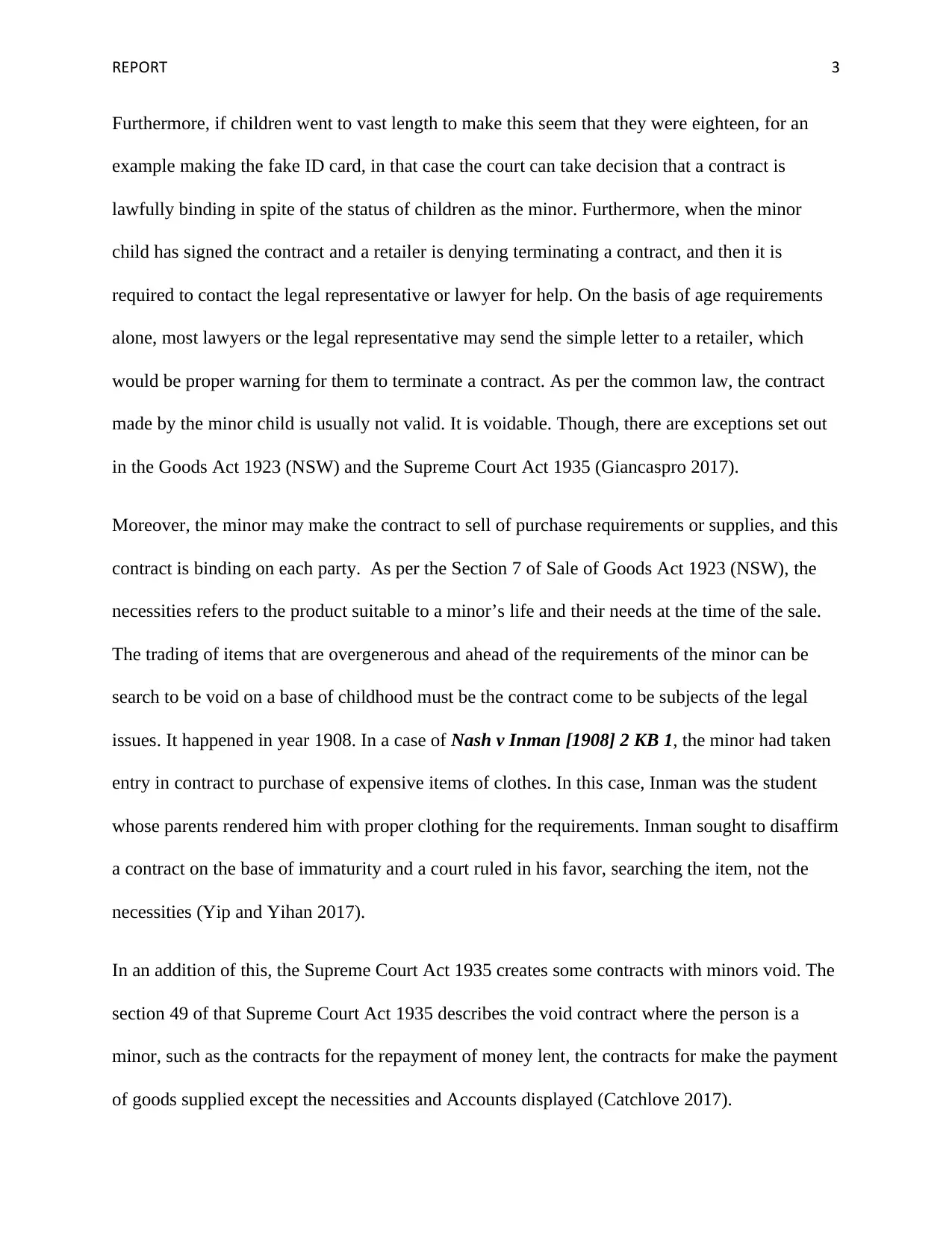
REPORT 3
Furthermore, if children went to vast length to make this seem that they were eighteen, for an
example making the fake ID card, in that case the court can take decision that a contract is
lawfully binding in spite of the status of children as the minor. Furthermore, when the minor
child has signed the contract and a retailer is denying terminating a contract, and then it is
required to contact the legal representative or lawyer for help. On the basis of age requirements
alone, most lawyers or the legal representative may send the simple letter to a retailer, which
would be proper warning for them to terminate a contract. As per the common law, the contract
made by the minor child is usually not valid. It is voidable. Though, there are exceptions set out
in the Goods Act 1923 (NSW) and the Supreme Court Act 1935 (Giancaspro 2017).
Moreover, the minor may make the contract to sell of purchase requirements or supplies, and this
contract is binding on each party. As per the Section 7 of Sale of Goods Act 1923 (NSW), the
necessities refers to the product suitable to a minor’s life and their needs at the time of the sale.
The trading of items that are overgenerous and ahead of the requirements of the minor can be
search to be void on a base of childhood must be the contract come to be subjects of the legal
issues. It happened in year 1908. In a case of Nash v Inman [1908] 2 KB 1, the minor had taken
entry in contract to purchase of expensive items of clothes. In this case, Inman was the student
whose parents rendered him with proper clothing for the requirements. Inman sought to disaffirm
a contract on the base of immaturity and a court ruled in his favor, searching the item, not the
necessities (Yip and Yihan 2017).
In an addition of this, the Supreme Court Act 1935 creates some contracts with minors void. The
section 49 of that Supreme Court Act 1935 describes the void contract where the person is a
minor, such as the contracts for the repayment of money lent, the contracts for make the payment
of goods supplied except the necessities and Accounts displayed (Catchlove 2017).
Furthermore, if children went to vast length to make this seem that they were eighteen, for an
example making the fake ID card, in that case the court can take decision that a contract is
lawfully binding in spite of the status of children as the minor. Furthermore, when the minor
child has signed the contract and a retailer is denying terminating a contract, and then it is
required to contact the legal representative or lawyer for help. On the basis of age requirements
alone, most lawyers or the legal representative may send the simple letter to a retailer, which
would be proper warning for them to terminate a contract. As per the common law, the contract
made by the minor child is usually not valid. It is voidable. Though, there are exceptions set out
in the Goods Act 1923 (NSW) and the Supreme Court Act 1935 (Giancaspro 2017).
Moreover, the minor may make the contract to sell of purchase requirements or supplies, and this
contract is binding on each party. As per the Section 7 of Sale of Goods Act 1923 (NSW), the
necessities refers to the product suitable to a minor’s life and their needs at the time of the sale.
The trading of items that are overgenerous and ahead of the requirements of the minor can be
search to be void on a base of childhood must be the contract come to be subjects of the legal
issues. It happened in year 1908. In a case of Nash v Inman [1908] 2 KB 1, the minor had taken
entry in contract to purchase of expensive items of clothes. In this case, Inman was the student
whose parents rendered him with proper clothing for the requirements. Inman sought to disaffirm
a contract on the base of immaturity and a court ruled in his favor, searching the item, not the
necessities (Yip and Yihan 2017).
In an addition of this, the Supreme Court Act 1935 creates some contracts with minors void. The
section 49 of that Supreme Court Act 1935 describes the void contract where the person is a
minor, such as the contracts for the repayment of money lent, the contracts for make the payment
of goods supplied except the necessities and Accounts displayed (Catchlove 2017).
⊘ This is a preview!⊘
Do you want full access?
Subscribe today to unlock all pages.

Trusted by 1+ million students worldwide
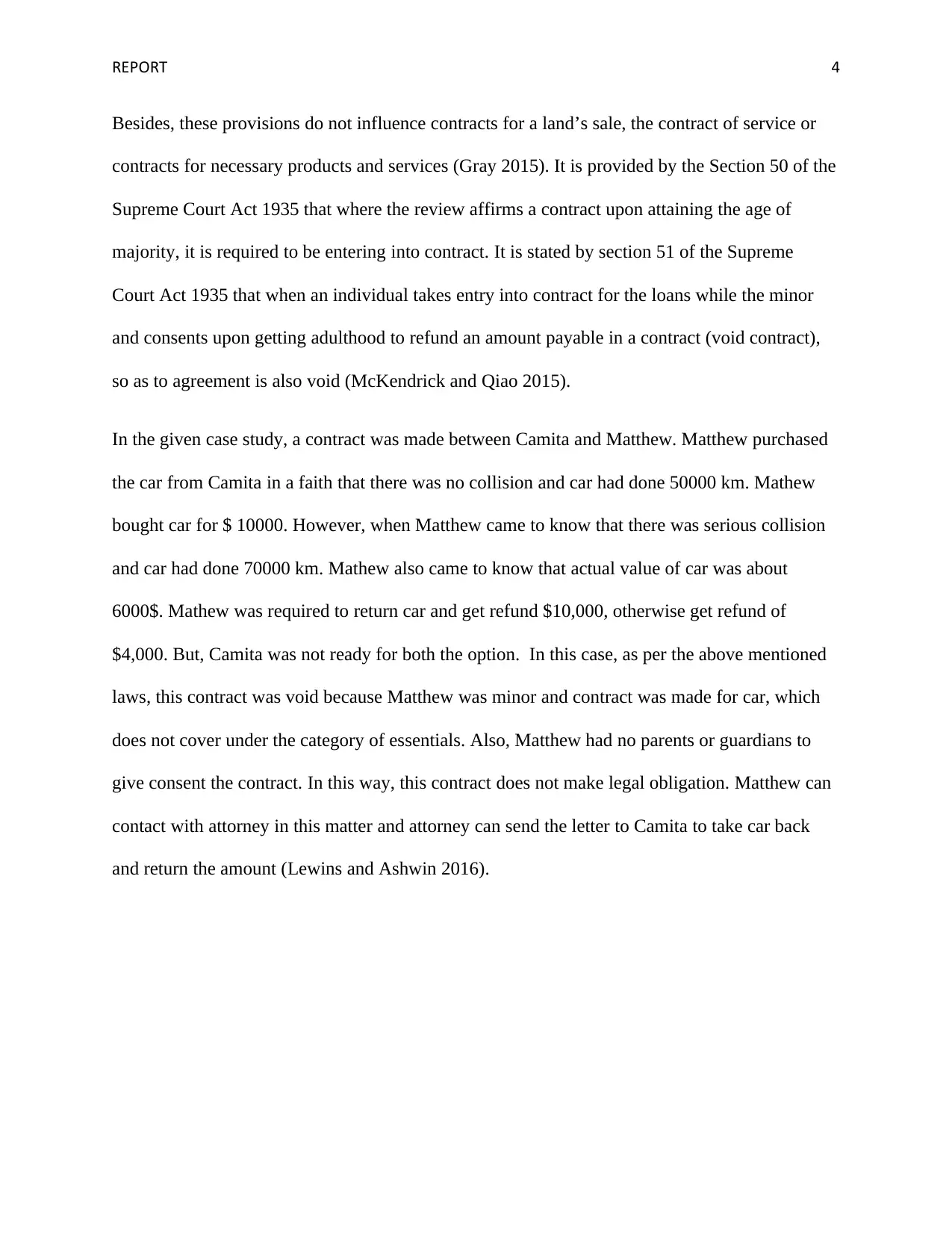
REPORT 4
Besides, these provisions do not influence contracts for a land’s sale, the contract of service or
contracts for necessary products and services (Gray 2015). It is provided by the Section 50 of the
Supreme Court Act 1935 that where the review affirms a contract upon attaining the age of
majority, it is required to be entering into contract. It is stated by section 51 of the Supreme
Court Act 1935 that when an individual takes entry into contract for the loans while the minor
and consents upon getting adulthood to refund an amount payable in a contract (void contract),
so as to agreement is also void (McKendrick and Qiao 2015).
In the given case study, a contract was made between Camita and Matthew. Matthew purchased
the car from Camita in a faith that there was no collision and car had done 50000 km. Mathew
bought car for $ 10000. However, when Matthew came to know that there was serious collision
and car had done 70000 km. Mathew also came to know that actual value of car was about
6000$. Mathew was required to return car and get refund $10,000, otherwise get refund of
$4,000. But, Camita was not ready for both the option. In this case, as per the above mentioned
laws, this contract was void because Matthew was minor and contract was made for car, which
does not cover under the category of essentials. Also, Matthew had no parents or guardians to
give consent the contract. In this way, this contract does not make legal obligation. Matthew can
contact with attorney in this matter and attorney can send the letter to Camita to take car back
and return the amount (Lewins and Ashwin 2016).
Besides, these provisions do not influence contracts for a land’s sale, the contract of service or
contracts for necessary products and services (Gray 2015). It is provided by the Section 50 of the
Supreme Court Act 1935 that where the review affirms a contract upon attaining the age of
majority, it is required to be entering into contract. It is stated by section 51 of the Supreme
Court Act 1935 that when an individual takes entry into contract for the loans while the minor
and consents upon getting adulthood to refund an amount payable in a contract (void contract),
so as to agreement is also void (McKendrick and Qiao 2015).
In the given case study, a contract was made between Camita and Matthew. Matthew purchased
the car from Camita in a faith that there was no collision and car had done 50000 km. Mathew
bought car for $ 10000. However, when Matthew came to know that there was serious collision
and car had done 70000 km. Mathew also came to know that actual value of car was about
6000$. Mathew was required to return car and get refund $10,000, otherwise get refund of
$4,000. But, Camita was not ready for both the option. In this case, as per the above mentioned
laws, this contract was void because Matthew was minor and contract was made for car, which
does not cover under the category of essentials. Also, Matthew had no parents or guardians to
give consent the contract. In this way, this contract does not make legal obligation. Matthew can
contact with attorney in this matter and attorney can send the letter to Camita to take car back
and return the amount (Lewins and Ashwin 2016).
Paraphrase This Document
Need a fresh take? Get an instant paraphrase of this document with our AI Paraphraser
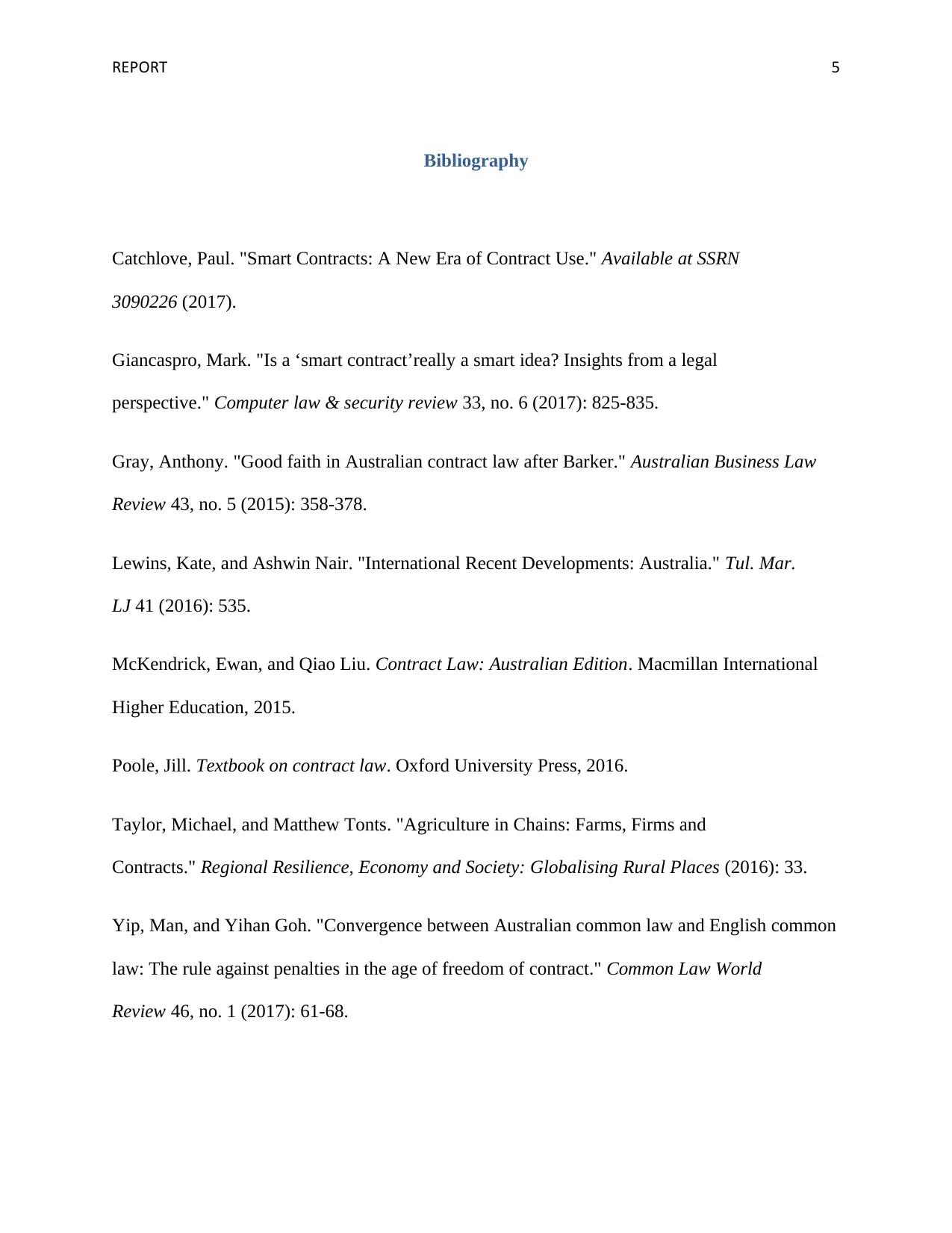
REPORT 5
Bibliography
Catchlove, Paul. "Smart Contracts: A New Era of Contract Use." Available at SSRN
3090226 (2017).
Giancaspro, Mark. "Is a ‘smart contract’really a smart idea? Insights from a legal
perspective." Computer law & security review 33, no. 6 (2017): 825-835.
Gray, Anthony. "Good faith in Australian contract law after Barker." Australian Business Law
Review 43, no. 5 (2015): 358-378.
Lewins, Kate, and Ashwin Nair. "International Recent Developments: Australia." Tul. Mar.
LJ 41 (2016): 535.
McKendrick, Ewan, and Qiao Liu. Contract Law: Australian Edition. Macmillan International
Higher Education, 2015.
Poole, Jill. Textbook on contract law. Oxford University Press, 2016.
Taylor, Michael, and Matthew Tonts. "Agriculture in Chains: Farms, Firms and
Contracts." Regional Resilience, Economy and Society: Globalising Rural Places (2016): 33.
Yip, Man, and Yihan Goh. "Convergence between Australian common law and English common
law: The rule against penalties in the age of freedom of contract." Common Law World
Review 46, no. 1 (2017): 61-68.
Bibliography
Catchlove, Paul. "Smart Contracts: A New Era of Contract Use." Available at SSRN
3090226 (2017).
Giancaspro, Mark. "Is a ‘smart contract’really a smart idea? Insights from a legal
perspective." Computer law & security review 33, no. 6 (2017): 825-835.
Gray, Anthony. "Good faith in Australian contract law after Barker." Australian Business Law
Review 43, no. 5 (2015): 358-378.
Lewins, Kate, and Ashwin Nair. "International Recent Developments: Australia." Tul. Mar.
LJ 41 (2016): 535.
McKendrick, Ewan, and Qiao Liu. Contract Law: Australian Edition. Macmillan International
Higher Education, 2015.
Poole, Jill. Textbook on contract law. Oxford University Press, 2016.
Taylor, Michael, and Matthew Tonts. "Agriculture in Chains: Farms, Firms and
Contracts." Regional Resilience, Economy and Society: Globalising Rural Places (2016): 33.
Yip, Man, and Yihan Goh. "Convergence between Australian common law and English common
law: The rule against penalties in the age of freedom of contract." Common Law World
Review 46, no. 1 (2017): 61-68.
1 out of 5
Related Documents
Your All-in-One AI-Powered Toolkit for Academic Success.
+13062052269
info@desklib.com
Available 24*7 on WhatsApp / Email
![[object Object]](/_next/static/media/star-bottom.7253800d.svg)
Unlock your academic potential
Copyright © 2020–2026 A2Z Services. All Rights Reserved. Developed and managed by ZUCOL.





